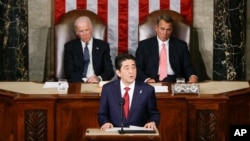Authorities in South Korea and China were mostly critical of Japanese Prime Minister Shinzo Abe’s speech to the U.S. Congress.
In his speech Wednesday to a joint session of the U.S. lawmakers, Abe expressed remorse over the war and offered condolences for those who died.
But Abe did not offer leaders in South Korea and China what they have been calling for: a direct acknowledgment and apology for the atrocities committed by the Japanese Imperial Army during its colonial rule over much of Asia.
In particular, they want Japan to atone for the sexual enslavement of some 200,000 girls and women, referred to as “comfort women.”
Missed opportunity
South Korea’s Foreign Ministry spokesman Noh Kwang-il said Abe missed an opportunity for true reconciliation.
Noh said it is important to build trust and relations for cooperation with the international society through honest recognition and self-reflection on past wrongdoings. But he said Japan is moving the opposite way.
The Chinese media also criticized the speech for not directly addressing the issue. In Beijing, a foreign ministry spokesman called for Japan to “be scrupulous” in statements on “Japan’s past history of aggression.”
As Abe moves to expand the military’s role, the issue continues to strain relations between Tokyo and its neighbors. The prime minister has said he will uphold past statements of apology offered by his predecessors.
These include the statement made by Japan’s chief Cabinet secretary Yohei Kono in 1993, who apologized to the women forced to serve Japanese soldiers at military brothels in World War II. And it includes the statement issued in 1995 by Prime Minister Tomiichi Murayama, who apologized for the “tremendous damage and suffering” Japan inflicted upon the people of many countries, particularly to those of Asian nations.
Robert Dujarric, director of the Institute of Contemporary Asian Studies at Temple University's Tokyo campus, said Abe’s refusal to directly acknowledge Japan committed atrocities is a reflection of his beliefs.
“He is emotionally attached in this. I think it is difficult for us to understand that there are politicians that sometimes believe what they say," Dujarric said.
He said offering the kind of apology China and South Korea are demanding would not cost the Japanese prime minister significant political support. Instead, he said, Abe will not apologize because he does not believe he needs to.
Dujarric said for Abe the politics surrounding the controversy over World War II sex slaves are less important than his need to win concessions from farmers to join the U.S. led Trans-Pacific Partnership free trade agreement.
“That is a much more complex thing than comfort women, because you are not going to lose or win votes over sex slavery. You are going to potentially lose votes and contributions over agriculture," he said.
Focus on future
Abe has said he would like to focus on the future, to end the post-war pacifist limits put on the Japanese military and to take a more active role in regional security.
But a Japan analyst with the Sejong Institute in South Korea, Kim Soung-chul, said Abe’s refusal to acknowledge the past reinforces Seoul’s concerns over Tokyo’s plans to again become a military power.
“Korean people think we have kind of a history of experience of colonization, so we do not want Japan to have a strong military basically," Kim said, adding there is still significant support in South Korea for working with Tokyo on trade and in containing the North Korean nuclear threat.
“So Korea and Japan should cooperate in many ways. And now the past history is just one aspect of that conflict between two countries, so we can come over, overcome this conflict," he said.
Kim said one important factor that prevents the controversy over the past from escalating into a future conflict is Washington’s strong alliance with Japan and South Korea.
